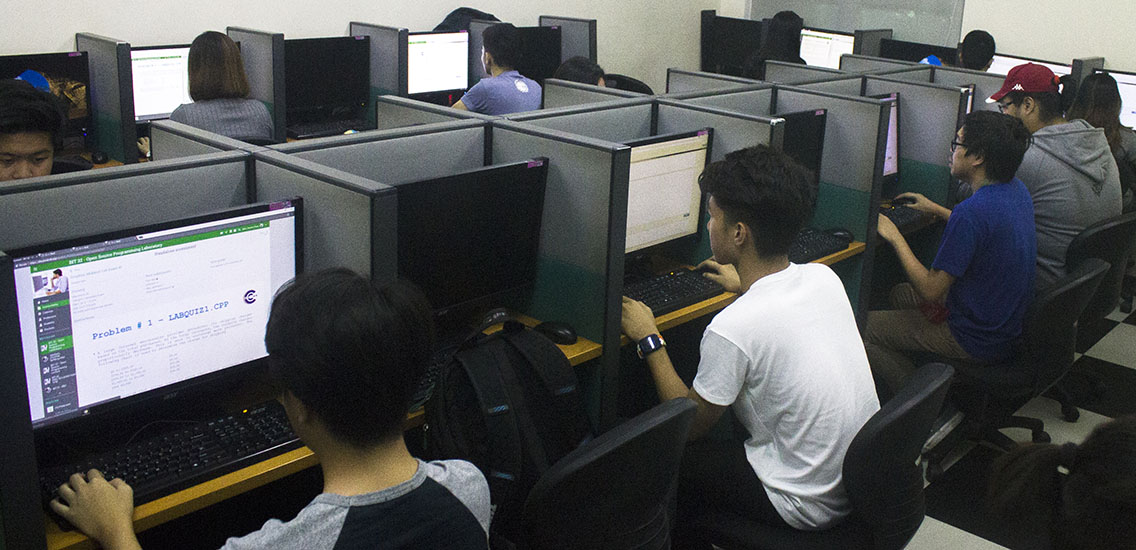CICS, COS deans discuss CSCS’ separation
The College of Science and Computer Studies (CSCS) has been reintroduced as two separate college departments, namely the College of Science (COS) and the College of Information and Computer Studies (CICS), on August 1, 2024, following a decade-long recommendation by the Philippine Accrediting Association of Schools, Colleges, and Universities (PAASCU), a non-profit organization that assesses and accredits academic programs and institutions in the Philippines.
In an exclusive interview with The HERALDO FILIPINO, CICS Dean Marivic Mitschek and COS Dean Rubie Causaren, the former CSCS Dean, explained that it took the administration a long time to implement this change out of consideration for several factors, such as the resources and the organizational system.
“This is the time, actually, for us to have separate individuality… as well as different goals and visions for each of the [colleges],” Mitschek said.
Similarly, Causaren shared that the main reason for the separation is to comply with PAASCU’s long-standing recommendation, noting that Science and Information Technology are typically housed in separate colleges in other universities, as opposed to DLSU-D, where the two fields were previously combined under CSCS.
Challenges faced
Despite facing difficulties in adjusting to the changes brought by the separation, Mitschek described the process as a “happy divorce.”
When asked about the future plans for facilities and infrastructures, the CICS Dean explained that the two colleges will be sharing some of their offices in the meantime, gradually adjusting to the changes posed by the separation.
“So [the office space was] supposed to be occupied by the College of Science, but the separation of the two colleges entails that the College of Information and Computer Studies administrators also have their office spaces, so we are sharing… We have to show PAASCU that there is already an initiative to really separate the colleges,” she explained.
In terms of budget, she revealed that the CICS and COS share a common budget, reiterating that the student government (SG) governors of both colleges have already discussed how the students’ budgets would be allocated separately.
The separation of the student population has impacted how administrative duties are allocated, with the CICS managing a larger student body and the COS handling a smaller number.
.“[It was] sad because last year was [also] our last year as a College of Science and Computer Studies. But we also find joy because, finally… the colleges are now separated, so we can really focus on the programs,” she stated.
Smoothening the transition
With regards to adjustments, Mitschek expects no significant changes, explaining that the faculty and student populations are the same people she handled as the former Computer Studies Department’s chairperson.
“It’s just that we now have a different roadmap than that of the College of Science. We now have a new vision and identity,” she expressed.
Meanwhile, Causaren expressed, “To smoothen things out… we have our strategic plans…. Each college has its own strategic plan, and that would be the one to guide us in order to roll out our programs, especially in relation to accreditation, in relation to student achievement[s], and others in faculty development.”
In terms of curriculum revisions, Mitschek explained that while the core professional courses remain aligned with the existing CHED memorandum for IT and CS programs, the main difference lies in the proposed electives, which are being updated to bridge gaps in employability and keep pace with rapid technological advancements.
Both deans emphasized the importance of student engagement through the activities of the program councils (PCs) and college student governments (CSGs) of their respective colleges.
On new programs, long-term plans
Causaren and Mitschek shared that the separation is very timely and beneficial for them to concentrate more on their respective colleges and programs, saying that they can better serve their students and their faculty members.
Mitschek shared that they are eyeing to offer a new course, Library Science, for the CICS, to be followed by Bioinformatics two years after, which is included in their proposal. She mentioned that it is one of the reasons why the administration has approved the proposal.
Meanwhile, Causaren noted that there are no plans yet to introduce new programs under the COS but is hopeful that the Physical Sciences department can have its program soon.
She also reiterated, “Secondly, there is a plan for the University to have four programs assessed by the AUNQA, that’s ASEAN University Network Quality Assurance. And in preparation, there were a series of meetings, and also some faculty members, some administrators were already sent to the trainings in order to really ensure the success of the program that will be assessed.”
Causaren also shared that the administrators had a seminar or training on the International Students Office (ISO), which is focused more on assessment, accreditation of the program, maintenance of the levels, and the continued delivery of high-quality education to the students.
In terms of student IDs of former CSCS students, Mitschek said that there are currently no plans to change them, emphasizing the purpose of the new uniforms instead.
“Hindi pa muna, because it would entail cost… So ‘yung mga incoming, instead of the ID, uniforms. Each college has a different color [necktie]… So instead of having it d’un sa ID na mga old, so ang plano ata ng admin is for us to have ‘yung iba-iba na stripe ng sa uniform ng mga bago,” adding that the CICS and COS labels are reflected on the IDs of the first-year students.
Originally published in Heraldo Filipino Volume 39, Issue 1



